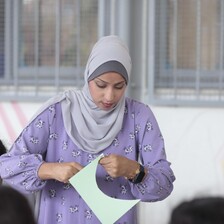The Electronic Intifada 14 December 2020

Huge numbers of women require financial assistance as unemployment increases in Gaza.
APA imagesSamira Wishah has displayed the acumen and diligence needed to run a business.
Two years ago, she set up a catering firm. Operating from her home in Bureij refugee camp, central Gaza, she prepared a range of meals – sometimes with help from her husband – and delivered them to everyone who placed orders.
The dishes included traditional Palestinian recipes such as maqlooba, a rice, vegetable and meat casserole, and fatteh, a mix of bread, yogurt, meat and chickpeas – as well as burgers and sushi. Wishah won new clients by whetting their appetites with pictures of her dishes that she circulated on the internet.
“My business was very successful,” said Wishah, 35. “Then everything stopped.”
Restrictions introduced in response to the COVID-19 pandemic have meant that Wishah can no longer offer a delivery service.
The situation has caused great difficulties.
Wishah – a mother of five – has been the main breadwinner for her family in recent years. She had decided to establish her business as her husband had long been unemployed.
“My own dreams and the dreams I had for my children’s future have collapsed,” she said.
Breadwinners on the brink
Women were estimated to be the main breadwinners in approximately nine percent of Gaza’s households last year.
Naima Abu Iyada – also from Bureij camp – is among those in that category. She has three children and an unemployed husband.
Two years ago, she formed an educational center, offering classes in both Arabic and English. She sought to teach languages in a creative way, often using games.
There was considerable demand for her services and she credits the experience with saving her marriage, which had been under strain.
Unfortunately, a number of her students tested positive for the coronavirus and the center had to close in August.
“I can no longer receive and teach students,” Abu Iyada, 43, said. “My dream was to promote education in unconventional ways and to share my ideas with schools. I didn’t anticipate that my dreams would be destroyed.”
Wages shrink
Yaseen Abu Odeh, a representative of the Palestinian Working Women Society for Development, noted that poverty has worsened in Gaza over the past year.
“The pandemic has really hurt working women in Gaza, which is really tragic as many of them are the primary breadwinners for their families,” he said. “There are some employers who furloughed the contracts of many women or reduced their pay to less than the minimum wage.”
Gaza’s minimum wage is only around $200 per month. About 84 percent of Gaza’s private sector workers received less than that amount in the period between July and September this year.
Female unemployment reached 65 percent in Gaza during those months, compared to 44 percent for men, the Palestinian Central Bureau of Statistics has calculated.
Health worsens
Yasmeen Abu Touq, 33, set up a sweet-making business in her kitchen. Along with her husband, she would sell the candy outside schools in the Khan Younis area of Gaza.
With schools closed because of the pandemic, her sales opportunities have disappeared.
“I used to spend long hours making colored sweets for children,” she said. “I would get up very early every morning so I could sell them before school started. But I have not been able to work for nearly a year now.”
Abu Touq is struggling to make ends meet. She has seven children, three of whom need hearing aids.
With her income reduced, she has been relying on neighbors for financial support.
Hana Shehadeh, a 60-year-old from Gaza City, has cancer. As the treatment she requires is not available inside Gaza, she must visit hospitals in the West Bank regularly.
To pay her expenses, Shehadeh had been making sweets and offering a delivery service. She has stopped doing so because of the pandemic.
“My work was the only way I could afford treatment, the food supplements that I need and to pay for my travel,” she said. “My husband cannot pay for my treatment because he has no work. And we have to support our children in university.”
Shehadeh has thought about trying to find other work. “But the situation with the virus has really damaged me physically and mentally,” she said. “I hope this pandemic will end soon.”
Ruwaida Amer is a journalist based in Gaza.





